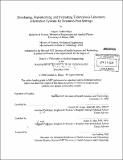| dc.contributor.advisor | Hamish S.F. Fraser. | en_US |
| dc.contributor.author | Blaya, Joaquin A. (Joaquin Andres), 1978- | en_US |
| dc.contributor.other | Harvard University--MIT Division of Health Sciences and Technology. | en_US |
| dc.date.accessioned | 2009-10-01T15:52:34Z | |
| dc.date.available | 2009-10-01T15:52:34Z | |
| dc.date.copyright | 2008 | en_US |
| dc.date.issued | 2009 | en_US |
| dc.identifier.uri | http://hdl.handle.net/1721.1/47852 | |
| dc.description | Thesis (Ph. D.)--Harvard-MIT Division of Health Sciences and Technology, February 2009. | en_US |
| dc.description | Includes bibliographical references (p. 132-143). | en_US |
| dc.description.abstract | Multi-drug resistant tuberculosis (MDR-TB) patients in resource-poor settings experience large delays in starting appropriate drug regimens and are often not monitored appropriately due to an overburdened health care system, communication delays, and missing or error-prone data. Medical information systems can be used to alleviate these problems by increasing the timeliness and quality of laboratory information available. The research reported in this thesis developed, implemented, and evaluated two such systems in the urban, resource-poor setting of Lima, Peru in institutions with and without internet. The first part addresses the electronic collection of tuberculosis (TB) laboratory information from multiple institutions without internet. A handheld computer-based system was developed and implemented. A cluster randomized controlled trial and before-and-after comparison showed that this system had a significant effect in reducing processing times from 23 to 8 days, the proportion of cultures with delays >90 days from 9.2% to 0.1%, the number of errors by 57.1%, and the work-hours necessary to process results by 60%. A cost and timeline framework was developed to allow other organizations in resource-poor settings to implement this technology. The second part addresses a web-based system, e-Chasqui, developed to provide electronic communication and reporting of TB laboratory information to health care personnel within institutions with internet. A cluster randomized controlled trial showed that access to e-Chasqui resulted in significantly less time to receipt of test results, a 56% reduction in tests taking over 60 days to arrive and a 98% reduction of results that never arrived, as well as a significantly faster time to culture conversion among patients in intervention versus control centers. | en_US |
| dc.description.abstract | (cont.) These two parts describe verified medical informatics tools and an implementation methodology for settings both with and without internet connectivity. | en_US |
| dc.description.statementofresponsibility | by Joaquin Andres Blaya. | en_US |
| dc.format.extent | 154 p. | en_US |
| dc.language | eng spa | en_US |
| dc.language.iso | eng | en_US |
| dc.publisher | Massachusetts Institute of Technology | en_US |
| dc.rights | M.I.T. theses are protected by
copyright. They may be viewed from this source for any purpose, but
reproduction or distribution in any format is prohibited without written
permission. See provided URL for inquiries about permission. | en_US |
| dc.rights.uri | http://dspace.mit.edu/handle/1721.1/7582 | en_US |
| dc.subject | Harvard University--MIT Division of Health Sciences and Technology. | en_US |
| dc.title | Developing, implementing, and evaluating tuberculosis laboratory information systems for resource-poor settings | en_US |
| dc.title.alternative | Developing, implementing, and evaluating TB laboratory information systems for resource-poor settings | en_US |
| dc.title.alternative | Tuberculosis laboratory information systems for resource-poor settings | en_US |
| dc.type | Thesis | en_US |
| dc.description.degree | Ph.D. | en_US |
| dc.contributor.department | Harvard University--MIT Division of Health Sciences and Technology | |
| dc.identifier.oclc | 430342392 | en_US |
